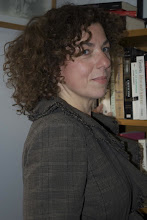I just read Marya Hornbacher's NYT bestseller Madness: A Bipolar Life. It strikes me that thinking about madness as "mental illness" enables us--madmen, madwomen, and the medical establishment--to construct heroic narratives about battles with madness. The idea of mental illness--the idea of a lifelong biochemical bogeyman that, like cancer, strikes down innocent people who have to "fight" it--lets us think of ourselves as heroes in a struggle against natural forces that are ruthless and violent. In one way or another, memoirs of madness tend to be constructed as narrative in the same way: here is the monster I had to fight, here's how I fought it, see how I almost died in the battle, see how I won (or am winning) the battle, look at my battle scars, now listen to what I learned from the fighting. Often, these narratives cast medical science in a supporting heroic role: the faithful companion who hands the hero her sword. The idea of mental illness positions the medical and pharmaceutical industries themselves as heroic actors in a mighty struggle. It's very appealing from a narrative standpoint.
The heroic profits from mental illness must be appealing as well, at least to those who pocket them. From the NYT Business section, April 27, 2010: "The newer generation of anti-psychotics has surpassed cholesterol-lowering drugs to become the nation's top-selling category of medications, accounting for $14.6 billion of the nation's $300 billion in drug spending last year. . . . Seroquel, a pill usually taken once or twice a day that sells for more than $4 each, was the fifth-best-selling drug in the United States last year . . . " Now that's big business!
Friday, April 30, 2010
Subscribe to:
Post Comments (Atom)

This is so true! When all intense human emotions are defined as illnesses, nobody benefits but the drug companies.
ReplyDeleteI've just blogged about this and linked to this blog. http://annerallen.blogspot.com
ReplyDelete